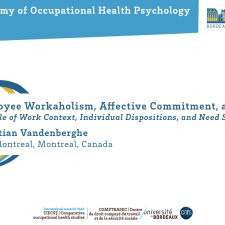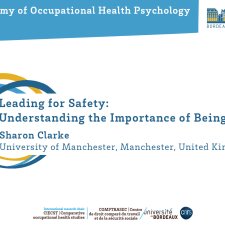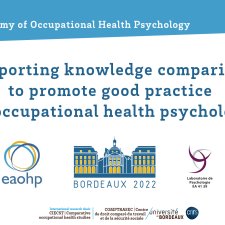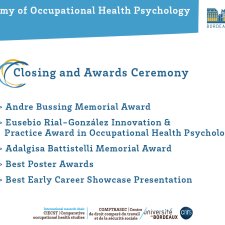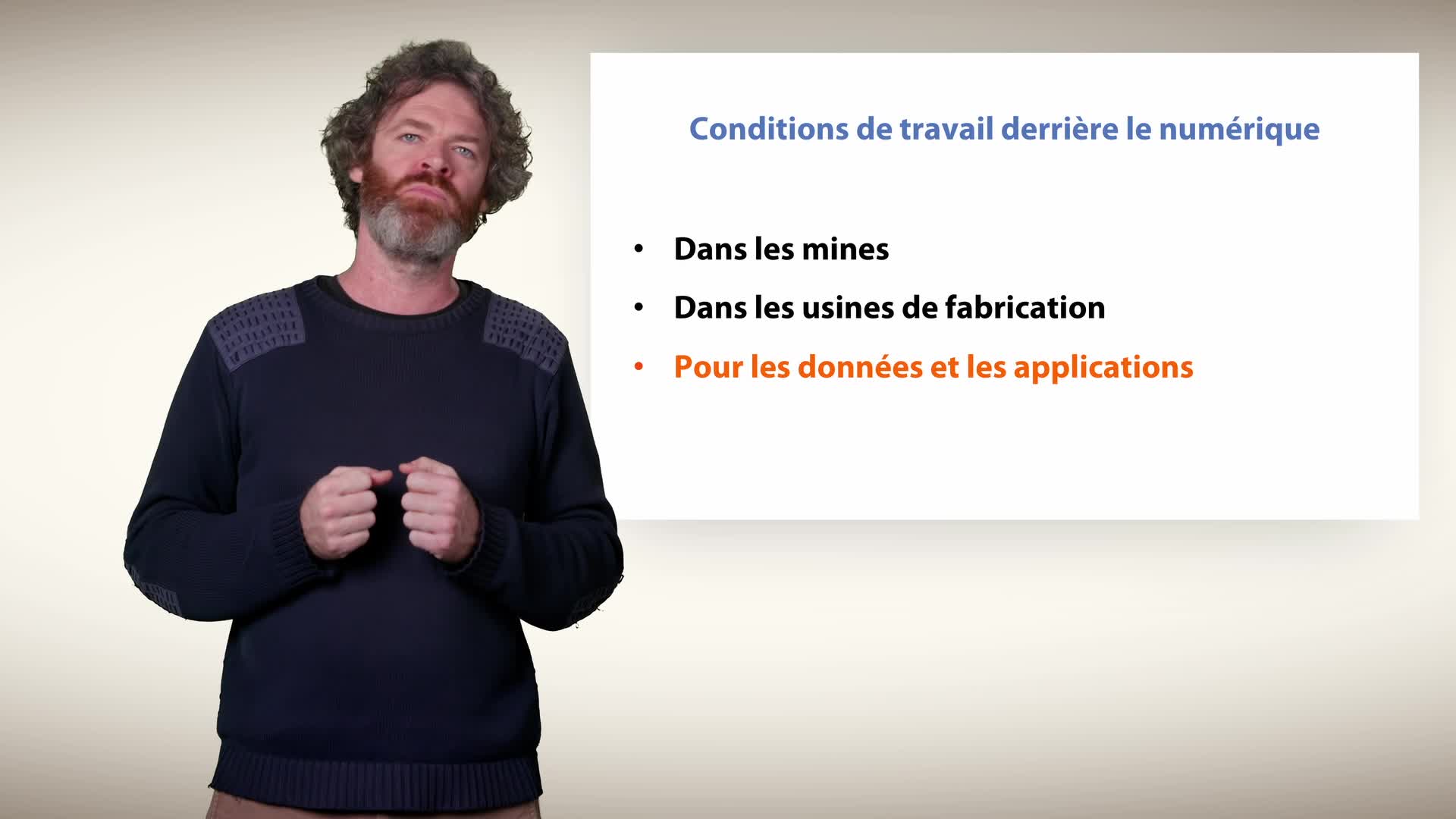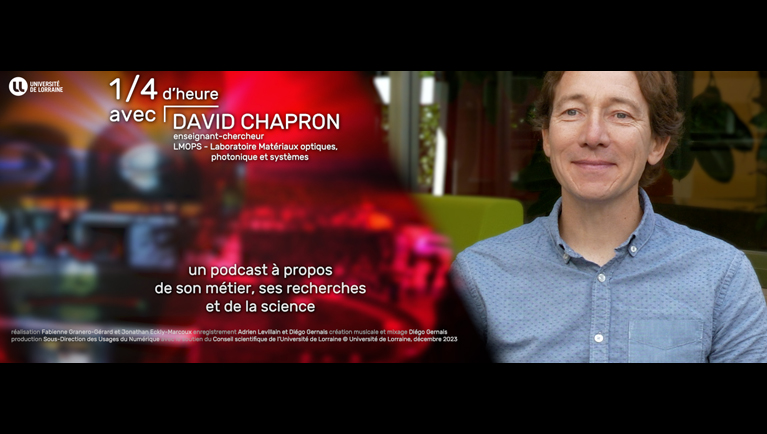Notice
Job Insecurity ‘After’ the Pandemic – Looking Back and Forward
- document 1 document 2 document 3
- niveau 1 niveau 2 niveau 3
Descriptif
Job insecurity refers to subjective concerns about the continued existence of the actual job and its characteristics, alternatively defined as the perceived threat of job loss and the worries related to that threat. The pandemic that affected Europe during the last two years also impacted on the quantity and quality of our employment, resulting in an increase of job insecurity perceptions among European workers. Prospects thus far (hopefully accurately) suggest the pandemic ‘to be over’. Consequently, this seems like a good moment to have a look at our knowledge on job insecurity thus far, and to discuss some ‘pending issues’ that need further study.
The keynote will cover three broad topics.
First of all, I would like to give an overview of the consequences of job insecurity for individuals (health and well-being) and organisations (attitudes and behaviours). This part will critically assess the frequently vented assumption that job insecurity ‘can be good’ and can motivate workers. I will do so by structuring the findings of reviews and meta-analyses in terms of the ‘Challenge versus Hindrance’ framework: is job insecurity a challenge stressor or a hindrance stressor when looking at health, well-being and performance ?
Next, I would like to review and discuss some ignored issues in job insecurity research. In the literature in this field, surprisingly little attention has been given to consequences that transcend the rather individual point of view of occupational health psychology (dominant focus on health, well-being, attitudes and behaviours of individuals). The second part of this keynote will therefore be focussed on the possible societal consequences of job insecurity. Relevant aspects encompass attitudes and trust towards the government, political attitudes and voting behaviour, but also attitudes towards the pandemic (like conspiracy views), which also have important consequences for health and well-being of citizens. Finally, some findings will be reviewed regarding cross-national differences. In an international conference like this one, the question arises whether countries differ in their levels of job insecurity, and whether the consequences of job insecurity are similar (or even identical) in all countries. When differences are found, one could wonder whether they can be explained by looking at macro levels variables such as legislation, social security systems, labour market policy and cultural values (to name a few). In doing so, I outline the importance to extend our level of analysis from the micro level (individual) to the meso level (organisations) and the macro level (structural and cultural aspects of countries).
>> Hans De Witte, KU Leuven, Leuven, Belgium
Intervention / Responsable scientifique
Dans la même collection
-
Employee Workaholism, Affective Commitment, and Well-Being: The Role of Work Context, Individual Di…
VandenbergheChristian15th European Academy of Occupational Health Psychology Conference 6-8 July 2022, University of Bordeaux, France The theme for the 2022 conference is ‘Supporting knowledge comparison to promote good
-
Leading for Safety: Understanding the Importance of Being a Leader
ClarkeSharon G.15th European Academy of Occupational Health Psychology Conference 6-8 July 2022, University of Bordeaux, France The theme for the 2022 conference is ‘Supporting knowledge comparison to promote good
-
EAOHP 2022 / Opening ceremony
LerougeLoïcLekaStavroulaMacéÉricMartinPhilippeLannegrand-WillemsRoely-Ida LydaMainguenéMarcDeprezGuillaume15th European Academy of Occupational Health Psychology Conference 6-8 July 2022, University of Bordeaux, France The theme for the 2022 conference is ‘Supporting knowledge comparison to promote good
-
EAOHP 2022 / Closing and Awards ceremony
TeohKevinDeprezGuillaumeLerougeLoïc15th European Academy of Occupational Health Psychology Conference 6-8 July 2022, University of Bordeaux, France The theme for the 2022 conference is ‘Supporting knowledge comparison to promote good
Sur le même thème
-
Le numérique, impasse pour l'humanité et la planète
LebrunFabienFabien Lebrun, chercheur à Nantes Université, parle dans cette vidéo des impacts sociaux et sanitaires du numérique.
-
Podcast 1/4 d'heure avec : David Chapron, enseignant-chercheur au Laboratoire Matériaux optiques, …
ChapronDavidRencontre avec David Chapron - enseignant-chercheur au LMOPS (Laboratoire Matériaux optiques, photonique et systèmes).
-
-
05. Se plier en quatre (avec Marie Soulhac)
SoulhacMariePoncetRomainAnimation : Romain Poncet, ingénieur de recherche en sociologie.
-
-
-
00. Des comptables et des conteurs (Présentation avec Jean-Philippe Pierron)
PierronJean-PhilippeIntroduction à la série de podcasts "Aux Grands Remèdes les Petits Mots".
-
02. Faire de son mieux (Avec Nathalie Vallet-Renart)
Vallet-RenartNathaliePodcast animé par Romain Poncet, ingénieur de recherche en sociologie.
-
-
-
01. Le soin du détail (Avec Emilie Chanel)
PoncetRomainChanelEmilieCe podcast est proposé par la Chaire Valeurs du Soin, animé par Romain Poncet, ingénieur de recherche en sociologie.
-
03. Soignants ou Soi-Niant (Avec Sonia Benkhelifa)
BenkhelifaSoniaAnimation : Romain Poncet, ingénieur de recherche en sociologie.


